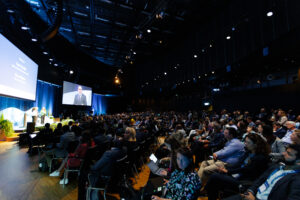When corruption is the flow, let’s be salmons!
9 December, International Anti-Corruption Day, Stockholm
For several decades democratization reforms have carried the hopes of being the counter-weight of corruption. However, recent research shows that anti-corruption efforts have not delivered in the past 15 years (Mungiu-Pippidi, 2017). There is no such thing as a linear relationship between ‘holding elections’ and reduced corruption. An electoral democratic governance regime is no guarantee for polyarchy, a governance in which power is invested in multiple people, or an open society.
Now a change of paradigm is taking place. Research in the field of behaviour science shows that, as social animals, we humans are infinitely more interested in putting our energy at the service of a common good than of our own interests, despite the Panama- and other Paradise Papers suggesting the opposite. Human commitment to a common good is indeed preconditioned. It requires confidence that the vast majority of peers also contributes to this common good.
In a society where justice and fair allocation of resources is taking place, one tends to comply with the norm, and navigate with the flow, behaving like the rest of one’s fellow citizens. In a society in which corruption is the norm, one will also “go with the flow”, making corruption a systemic disease that replicates and spreads (Persson, Rothstein, & Teorell, 2013).
To turn the tide of corruption, to start a positive spiral that builds and strengthens impartial, equitable and therefore integer governance, one needs to re-build and strengthen confidence in the governing institutions. Anti-corruption then is a matter of “trust-building”.
At SIWI we invest in capacity building that professionalizes civil servants and their home institutions. In the last decade SIWI has equipped water practitioners with the tools and resources to fight corruption. Some practitioners might not yet be empowered enough to swim, salmon-like, against the flow of corruption. In some institutions, the current of the flow might be too strong for them to swim on their own. But, from Laos to El Salvador, from Lebanon and Palestine to Tunisia, from Burkina Faso and Kenya to Zambia (find more about our work on Water Integrity here), we have seen lights shining on the horizon. We are very impressed by the dedication of partners and sector professionals in water integrity, by the risks taken and by the courage of going against the norm.
But it takes more than a few brave individuals to reverse the flow, reverting norms of corruption into a fairer, equitable and sustainable distribution system. Such a change requires a critical mass of a multitude of stakeholders playing the game, each in their role with their own clear responsibilities – politicians, regulators, financiers, civil servants, the media, consumers, civil society, academia. It requires them to act collectively. It takes collective action to make institutions and the water sector trustworthy again.
Next week in Barcelona, at the “Conference on Water Governance in MENA and wider Mediterranean region”, we will be gathering with representatives from governments, regulators, water utilities, basin authorities, civil society, academia, private sector, investment banks, multilateral agencies and international donors, to discuss concrete steps to fight corruption and mobilize collectives.
Join us in the further development of good governance policies and strategies. Share experiences and create synergies between country initiatives and projects! More info about the conference here. Follow us live on our Facebook and YouTube livestreams.
#UnitedAgainstCorruption
This blog is written by James Leten and Pilar Avello who work with water integrity at the SIWI-UNDP Water Governance Facility.
References
Mungiu-Pippidi, A. (2017). Seven Steps to Evidence-Based Anticorruption: A Roadmap. Expertgruppen för biståndsanalys (EBA) (Vol. ). Retrieved from http://www.riss.kr/link?id=A102679573
Persson, A., Rothstein, B., & Teorell, J. (2013). Why anticorruption reforms fail-systemic corruption as a collective action problem. Governance, 26(3), 449–471. https://doi.org/10.1111/j.1468-0491.2012.01604.x








